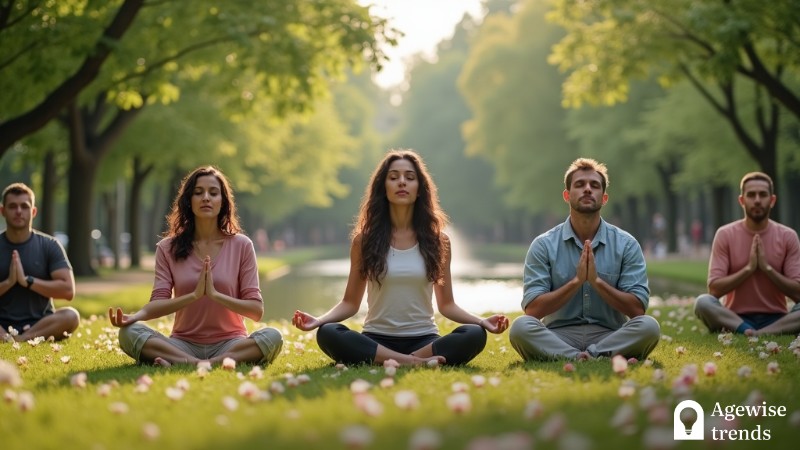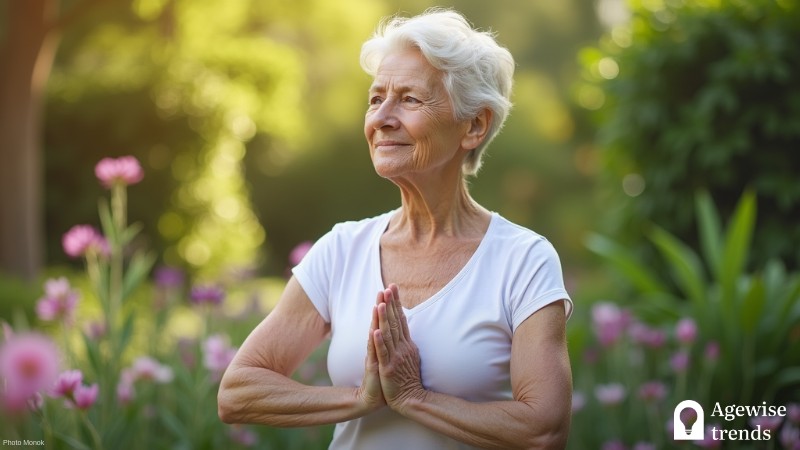Handling stress becomes a key part of staying healthy. For seniors, it’s especially important because stress can affect their physical health, memory, and mood. Recently, mindfulness meditation apps have become popular because they offer easy and effective ways to reduce stress. This article looks at how these apps can help seniors and shares other simple relaxation techniques.
Key Takeaways
Mindfulness meditation apps are revolutionizing stress management for seniors by offering easy and effective ways to reduce stress.
- Mindfulness apps offer guided meditation, breathing exercises, and tracking emotions to help seniors manage stress.
- Popular apps like Calm and Headspace have age-friendly practices that cater to different levels of mobility and focus, allowing seniors to customize their meditation plans and track progress.
- Incorporating mindfulness apps into daily routines can help seniors tackle ongoing stress, sleep better, and support their mind’s health by building emotional strength and reducing feelings of anxiety and depression.
Rise of mindfulness apps in stress management
Mindfulness meditation apps have become essential tools for managing stress, showing a big move toward easy-to-access wellness solutions. These apps have grown a lot in popularity recently because more people care about mental health and want convenient ways to practice self-care. By 2032, the market for these apps is expected to reach $4.25 billion, growing at about 13.71% each year. This growth shows that people, especially seniors, are recognizing the benefits of these flexible and easy-to-use wellness practices.
Mindfulness apps offer different ways to manage stress, like guided meditation, breathing exercises, and tracking emotions. Popular apps like Calm and Headspace have made their content suitable for older users with age-friendly practices. They offer short and simple sessions that cater to different levels of mobility and focus. Seniors can customize their meditation plans and keep track of their progress, which helps them feel a sense of achievement and control over their health.
New technologies, like artificial intelligence (AI), have made these apps even better. AI features look at user habits and suggest personalized meditation practices, making the experience more engaging and effective. Many apps also now include things like community support and live sessions, which help create a feeling of connection and accountability—important for older adults who may be feeling lonely.
Including mindfulness apps in daily routines helps seniors tackle ongoing stress, sleep better, and even support their mind’s health. Studies show that using these tools regularly can build emotional strength and reduce feelings of anxiety and depression. For seniors who are new to using digital platforms, many apps offer simple interfaces and guides, ensuring ease of use no matter their tech skills.
Practical relaxation techniques for seniors
Mindfulness apps offer structured help for managing stress, but adding other relaxation techniques can make them even more effective. Seniors can easily try simple, proven methods to pair with their app-based exercises.
1. Deep Breathing Exercises: Deep breathing is easy to do and helps calm the body. By taking slow, steady breaths, seniors can lower their heart rate and feel more relaxed. It’s great for quickly handling stress and can be done anywhere. When combined with app sessions, deep breathing becomes even more powerful, offering a complete way to relax.
2. Progressive Muscle Relaxation (PMR): PMR involves tensing and then relaxing different muscle groups, one by one. This helps in finding and easing tension, leading to deep relaxation. Seniors can sleep better and feel less anxious with PMR. Many mindfulness apps now offer guides for PMR, making it simple to add to any routine.
3. Gentle Physical Activity: Doing easy exercises like yoga or tai chi helps manage stress. These activities combine movement and mindfulness, helping seniors to stay in the moment while also improving flexibility and strength. For those who like digital help, some apps include yoga or mindfulness sessions for different ability levels.
Enhancing stress management
Many mindfulness apps now include social features to help seniors connect. You can join live meditation sessions, take part in group challenges, and engage in discussion forums. These activities let you meet others who share your interests, share your experiences, and stay motivated. It helps you feel less alone and stick with mindfulness for the long run.
Moreover, lots of apps work with healthcare teams and wellness groups to offer special programs for seniors. This gives you access to content that suits your needs, focusing on issues like chronic pain, trouble sleeping, and memory. As these partnerships grow, mindfulness apps will likely play an even bigger role in stress management and overall health for older adults.














